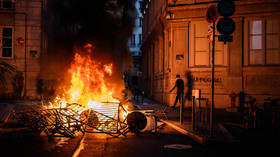France is facing a new generation of riots
The cause of unrest lies deeper than police crackdowns and social media censorship can reach

The ‘banlieue’, as the French suburbs are called, has been set ablaze regularly during riots since the 1970s. Things became particularly violent during the anti-police unrest in the fall of 2005. Almost 20 years later, everyone involved, police and protesters alike, are more than willing to resort to violence.
The events are almost taken from the same script: In autumn 2005, two youngsters of Arab origin, were electrocuted while trying to escape arrest by the French police; today we have two police officers who shot a juvenile of Algerian origin as he tried to escape in a stolen car. The event was captured on video and went viral on social media, similar to the case of George Floyd in the US three years ago, leading to Black Lives Matter uprisings around the world.
In the hours that followed, tens of thousands of mostly young males, many of them minors, went on to launch violent riots in the suburbs of French cities, from Nantes in the north to Marseille in the south. Numerous cars were torched, public buildings including schools were attacked, shops were ransacked and hundreds of people were arrested. In some places, the perpetrators, most of whom are third and fourth generation descendants of migrants, are even said to have used firearms to harass the locals living mostly in social housing.
Blame TikTok
The government responded by deploying armored vehicles, while large public events such as concerts were canceled. In addition, President Emmanuel Macron, who, ironically, had to cut short his presence at a failed EU summit on migration, announced that social media networks, especially TikTok, were the root cause for the escalation of violence. Addressing the platforms directly, Macron demanded the removal of ‘sensitive content’ and more checks on the nature of published content.
Last Friday, Twitter began to suppress user accounts in France which posted images and videos of the riots, a measure that even affected accounts whose owners were located outside of France and thus did not commit a criminal offense according to French media law. The French head of state also made the parents of those rioting minors responsible. As a reminder, his predecessor, Nicolas Sarkozy, in response to the growing violence committed by truants, had cut social benefits for their families. That was 15 years ago.
But can street riots be brought under control immediately and permanently by deploying armored vehicles, by censoring social media, or by putting pressure on the parents of minors? This is doubtful. Even if France regularly makes international headlines with such uprisings and riots, the blame does not lie solely with the authorities. It is a deeper-rooted dilemma that is shaking French society to its core, even though migration and integration are far better managed in France than in Germany or Austria.
The republic’s achievements
Becoming a French citizen is relatively easy: You have to have command of the French language and commit to the ideals of the republic, such as separation of politics and religion – the key issue here being the ban on headscarves in public spaces. You will never encounter notices or announcements in any language other than French in offices, administrative buildings, or hospitals. The language problem, which makes integration difficult in Germany and Austria, does not exist in France. The immigration offices organize and finance interpreters, but all essential information is also posted in Arabic, Turkish, and other languages in Viennese hospitals. Communication fails here because of the language barrier, which is not the case in France.
The vast majority of immigrants in France originate from the former colonies on the African continent and people there do speak French. Algeria was part of France until 1962. Migration towards France happened in waves. The Algerian war was an important chapter, since, among other things, hundreds of thousands of Arabs had to flee the country after it gained its independence because they had previously cooperated with the French authorities, for example. The political migration of poets and intellectuals and academics in the 1970s and 1980s increasingly turned into economic migration, reinforced by population pressure and human trafficking in the Mediterranean region.
With the adoption of the Barcelona Process in 1995, France in particular wanted to put an end to uncontrolled immigration and, together with Italy and Spain, initiated a series of association agreements with states in the southern and eastern Mediterranean region in order to keep their citizens in their home countries through investments in the local economy. These programs failed, and in some cases, even led to further social inequality. The so-called Arab Spring in 2011 unleashed further waves of migration, especially since the former ‘partners’ who were in control of the North African migration routes were deposed, most notably the Libyan head of state, Muammar Gaddafi, who was killed during a ‘humanitarian’ intervention, which amounted to bombing his country, with the French Air Force participating.
Despite all the problems which are faced especially by the third and fourth generation of immigrants, the French welfare state offers the possibility of social advancement. The public education system is at a better level than in the German-speaking region, where, according to some reports, up to 90% of the children in elementary schools in some urban areas do not have a command of German as a native language. I had the opportunity to study in France and I experienced there a meritocratic system in education and administration that was unknown in Austria. And social ascent is possible because the system is much more permeable than in Germany.
Even when looking at absolute figures, France remains in a better position than Austria, for example. In France, the proportion of people born abroad has been stable at around 10% for years. In Austria, this proportion has risen from 13% in 2015 to over 20% today. The massive immigration wave of 2015-16 hit Germany, the Scandinavian countries, and Austria because of their welfare systems, while France was at no time a target country for this mass immigration during those years. Terrorist attacks, namely those of 2013 on the Bataclan Club in Paris and 2016 in Nice, caused a severe shock to French society, which prior to these events was carefree and full of life. Subsequently, a state of emergency was declared and then extended. It was finally lifted in 2017, but some of its provisions were made permanent by a new law passed at the same time.
A hot summer of uncertainty
The French government is now contemplating a return to the state of emergency. Let’s imagine for a moment such a situation would arise in Russia, India, or China. Politicians across the EU and the entire Western media would bitterly bemoan the demise of democracy in those states, threaten them with new sanctions, and churn out special TV coverage for their constituent masses.
The UN high commissioner for human rights, Volker Turk, criticized racism in the French police, which in turn was sternly rejected by the French Foreign Ministry. There is no denying the decreasing reluctance on all sides to use violence. However, police violence can affect anyone in France, as many documented cases show. The anti-restriction protests during the Covid-19 pandemic alone were accompanied by sometimes brutal police operations.
There is often talk of staff shortages, a lack of political support, and other issues that increase the frustration and anger within the police force. Interior Minister Gerald Moussa Darmanin – of Maghrebian descent himself – has stepped forward in defense of the police. Darmanin is not without controversy as a person and politician. The way he masters this current crisis will shape the domestic political agenda in France.
How will the French government react? With nightly curfews after years of lockdown? With mass arrests that lead to overcrowded prisons and rob the judges of their last resources in overwhelmed courts? France is on the brink of a nervous breakdown in many aspects. And yet, based on the available data, the situation in France is not as explosive as in Germany or Austria. Social cohesion remains relatively solid. Everyone speaks French well enough to be able to yell at each other. A total speechlessness has not yet set in, while a mixture of old and new problems is brewing throughout Europe, such as the massive rise in costs for everyday life.
The French government has to reach comprehension on where the priorities lie in the near future. Questions on social issues have often caused political turning points – especially in France.
The statements, views and opinions expressed in this column are solely those of the author and do not necessarily represent those of RT.
https://www.rt.com/news/579041-france-riots-migration-unrest/



0 Comments:
Post a Comment
Subscribe to Post Comments [Atom]
<< Home